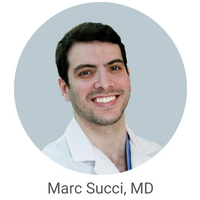NewsFeb | 13 | 2023
Research Spotlight: Trends in Oncological Imaging During the COVID-19 Pandemic Through the Vaccination Era

Marc Succi, MD, a physician-investigator in the Department of Radiology and Director of the MESH Incubator at Massachusetts General Hospital, is the senior author of an article in the journal Cancer Medicine, “Trends in oncological imaging during the COVID-19 pandemic through the vaccination era.”
What Question Were You Investigating?
The COVID-19 pandemic introduced major challenges to the care of cancer patients, and imaging was one of the aspects that was severely impacted. This study examines the impact that the COVID-19 pandemic has had on computed tomography (CT)-based oncologic imaging utilization.
What Was Your Approach?
We retrospectively analyzed cancer-related CT scans during four time periods: pre-COVID (1/5/20-3/14/20), COVID peak (3/15/20-5/2/20), post-COVID peak (5/3/20-12/19/20), and vaccination period (12/20/20-10/30/21). We analyzed CTs by imaging indication, setting, and hospital type. Using percentage decrease computation and student's t-test, we calculated the change in mean number of weekly cancer-related CTs for all periods compared to the baseline pre-COVID period. This study was performed at a single academic medical center and three affiliated hospitals.
What Were Your Findings?
- During the COVID peak, mean CTs decreased with cancer screening, initial workup, active cancer, and cancer surveillance CTs dropping by 81.8%, 56.3%, 31.7%, and 45.8%, respectively.
- During the post-COVID peak period, cancer screenings and initial workup CTs did not return to pre-pandemic imaging volumes. The ED saw increases in weekly CTs compared to pre-pandemic levels driven by increases in active cancer CTs.
- In the vaccination period, cancer screening CTs did not recover to baseline and initial cancer workup CTs doubled. The ED experienced increased cancer-related CTs, driven by active cancer CTs and initial workups.
What’s Next?
The pandemic continues to impact cancer care. We observe significant declines in cancer screening CTs through the end of 2021. Concurrently, we observed a 2x increase in initial cancer workup CTs and a 2.4x increase in active cancer CTs in the ED during the vaccination period, suggesting a boom of new cancers and more cancer exams associated with emergency level acute care.
Patients likely avoided seeking care due to concerns about acquiring the virus and a lack of education about the importance of screening care. We must now extend the timeline and implement programs to increase cancer imaging of the under-imaged groups.
Work Cited:
Chenga, D., Ghoshal, S., Zattra, O., Flash, M., Lang, M., Liu, R., Lev, M. H., Hirsch, J. A., Saini, S., Gee, M. S., Succi, M. D. (2023). Trends in oncological imaging during the COVID-19 pandemic through the vaccination era. Cancer Medicine
About the Massachusetts General Hospital
Massachusetts General Hospital, founded in 1811, is the original and largest teaching hospital of Harvard Medical School. The Mass General Research Institute conducts the largest hospital-based research program in the nation, with annual research operations of more than $1 billion and comprises more than 9,500 researchers working across more than 30 institutes, centers and departments. In July 2022, Mass General was named #8 in the U.S. News & World Report list of "America’s Best Hospitals." MGH is a founding member of the Mass General Brigham healthcare system.
-
![]()
- Director, MESH Incubator
Type
Centers and Departments
Check out the Mass General Research Institute blog
Bench Press highlights the groundbreaking research and boundary-pushing scientists working to improve human health and fight disease.
Support Research at Mass General
Your gift helps fund groundbreaking research aimed at understanding, treating and preventing human disease.

